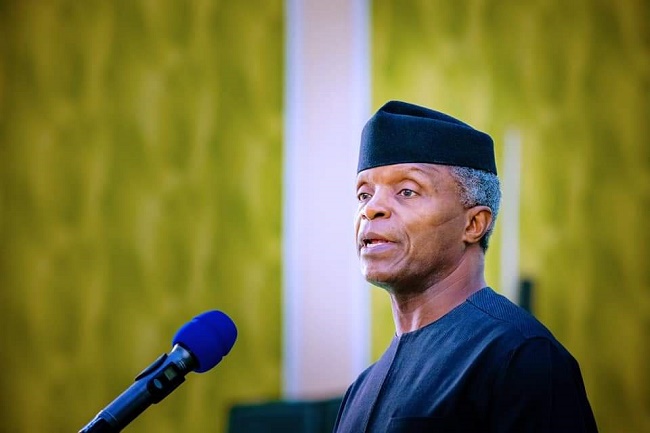The Federal Government of Nigeria is pioneering a voluntary billion dollars’ worth Carbon Market on the continent.

Laolu Akande, Senior Special Assistant to the President on Media and Publicity, Office of the Vice President, disclosed this a statement on Sunday, October 30, 2022, in Abuja.
He said: “It is an innovative climate change solution which will create, over the period of energy transition, millions of new jobs in Nigeria alone, according to estimates of the international experts.”
The initiative is said to be part of efforts of the Federal Government to attain the global net-zero emissions target.
The vice president is a member of the recently-formed international Steering Committee for the Africa Carbon Markets Initiative (ACMI), with the objective of facilitating the emergence and growth of the market in Africa.
Besides Osinbajo, other members of the Committee of the ACMI, which would be announced early in November at the COP27 meeting in Egypt, are former President of Colombia, Ivan Duque Marquez, and President of the African Development Bank, Akinwumi Adesina.
Officials of the United Nations, USAID, Gates Foundation and other international private sector players are also members.
ACMI’s estimates suggest that Nigeria alone could produce up to 30 million carbon credits per year by 2030, which at $20 dollars/credit would be worth over half a billion dollars annually.
“At this level of production, the industry could potentially support over 3 million Nigerian jobs.
“And Nigeria has only a portion of Africa’s total potential – the impact for the continent as a whole could be far greater,” ACMI’s estimates indicate.
The jobs would span the period of the energy transition, starting from the time the market is able to kick off till 2060.
The committee will be inaugurated at the forthcoming International Climate Change Conference in Egypt, tagged COP27, with the aim to lead advocacy for the realisation of the Carbon Credits initiative as an effective way of reducing emissions while financing green growth across Africa.
The Carbon Credit initiative prioritises the use of environmentally-friendly energy sources for domestic and industrial purposes.
For instance, carbon credits could support the conditional portion of Nigeria and other Africa nation’s nationally determined contributions (NDCs) under the Paris Agreement.
Nigeria’s carbon credit potential is concentrated in household devices and forestry sectors, both of which will attract significant benefits.
Household devices – like solar lanterns and clean cook stoves – contribute to expanding energy access and improving health outcomes, while carbon forestry credits enable the conservation of Nigeria’s rich biodiversity and support sustainable livelihoods.
As part of this vision, Nigeria aims to pioneer innovative climate solutions that will benefit Africa and the world.
One of these solutions is the production and sale of carbon credits, which have enormous potential for Africa that is only beginning to be explored.
The Federal Government is committed to supporting the development of the domestic carbon credit industry and is exploring strategies for how carbon credits can best catalyse investment and economic growth.
President Muhammadu Buhari and Osinbajo’s ongoing climate leadership has won applause for Nigeria with Federal Government’s policies in place to support the development of the industry.
Building on Nigeria’s history of climate action, the President signed the Climate Change Act of 2021 providing a framework for national coordination on climate change issues.
Some of the efforts for which the Buhari administration is globally acknowledged include the creation of the National Council on Climate Change, which the President inaugurated last month, with the authority needed to drive major emissions reductions.
Recently, Osinbajo launched the Federal Government’s Energy Transition Plan in August 2022, a detailed strategy outlining how Nigeria will reach global net zero emissions by 2060 while eliminating energy poverty.
To further support the domestic production of carbon credits, the Federal Government is developing a carbon credit activation plan.
This plan will clearly identify responsibility within the government for the regulation and promotion of carbon credits, and will outline a set of actions government can take to support the industry.
By Chijioke Okoronkwo
